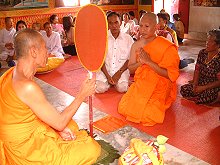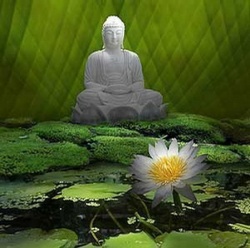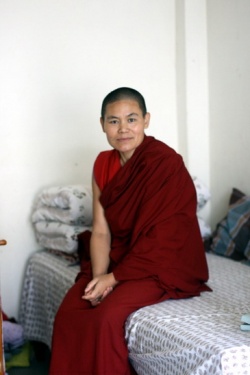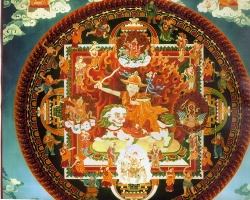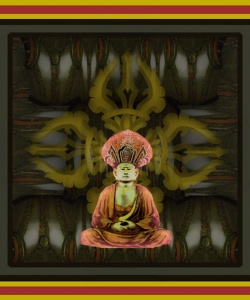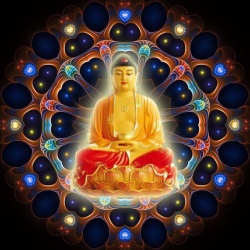Selāsuttaṁ: The Discourse about Selā
Selāsuttaṁ
The Discourse about Selā
170. Evaṁ me sutaṁ:
Thus I have heard:
ekaṁ samayaṁ Bhagavā Sāvatthiyaṁ viharati
at one time the Gracious One was dwelling near Sāvatthī
Jetavane Anāthapiṇḍikassa ārāme.
at Anāthapiṇḍika's grounds in Jeta's Wood.
Atha kho Selā bhikkhunī, pubbaṇhasamayaṁ nivāsetvā,
Then the nun Selā, having dressed in the morning time,
pattacīvaram-ādāya, Sāvatthiṁ piṇḍāya pāvisi.
after picking up her bowl and robe, was entering Sāvatthī for alms.
Sāvatthiyaṁ piṇḍāya caritvā, pacchābhattaṁ piṇḍapātapaṭikkantā,
After walking for alms in Sāvatthī, and returning from the alms-round after the meal,
yena Andhavanaṁ tenupasaṅkami divāvihārāya,
she approached the Blind Man's Wood to pass the day,
Andhavanaṁ ajjhogahetvā,
and having entered Blind Man's Wood,
aññatarasmiṁ rukkhamūle divāvihāraṁ nisīdi.
she sat down at the root of a certain tree to pass the day.
Atha kho Māro Pāpimā
Then the Wicked Māra
Selāya bhikkhuniyā bhayaṁ chambhitattaṁ lomahaṁsaṁ uppādetukāmo,
desiring to give rise to fear, terror, and horror in the nun Selā,
samādhimhā cāvetukāmo, yena Selā bhikkhunī tenupasaṅkami,
desiring to drive her out of concentration, approached the nun Selā,
upasaṅkamitvā Selaṁ bhikkhuniṁ gāthāya ajjhabhāsi:
and after approaching he addressed the nun Selā with a verse:
“Kenidaṁ pakataṁ bimbaṁ, kva nu bimbassa kārako,
“By whom was this manikin made, [1] where is this manikin's maker,
Kva nu bimbaṁ samuppannaṁ, kva nu bimbaṁ nirujjhatī?” ti
Where has this manikin [2] risen, and where does the manikin cease?”
Atha kho Selāya bhikkhuniyā etad-ahosi:
Then it occurred to the nun Selā:
“Ko nu khvāyaṁ manusso vā amanusso vā gāthaṁ bhāsatī?” ti
“Who is this, a human or a non-human, speaking this verse?”
Atha kho Selāya bhikkhuniyā etad-ahosi:
Then it occurred to the nun Selā:
“Māro kho ayaṁ Pāpimā
“This is the Wicked Māra
mama bhayaṁ chambhitattaṁ lomahaṁsaṁ uppādetukāmo,
desiring to give rise to fear, terror, and horror in me,
samādhimhā cāvetukāmo, gāthaṁ bhāsatī.” ti
desiring to drive me out of concentration, who speaks this verse.”
Atha kho Selā bhikkhunī: Māro ayaṁ Pāpimā iti viditvā,
Then the nun Selā having understood: This is the Wicked Māra,
Māraṁ Pāpimantaṁ gāthāhi paccabhāsi:
replied with these verses to the Wicked Māra:
“Na-y-idaṁ attakataṁ bimbaṁ, na-y-idaṁ parakataṁ aghaṁ,
“This manikin's not made by oneself, pain [3] is not made by another,
Hetuṁ paṭicca sambhūtaṁ, hetubhaṅgā nirujjhati.
Through conditions it arises, conditions broken [4] it ceases.
Yathā aññataraṁ bījaṁ khette vuttaṁ virūhati
Just as a certain seed when it has been sown in a field will grow
Pathavīrasañ-ca āgamma sinehañ-ca tad-ūbhayaṁ,
Through both of these (conditions): the earth's essence and the moisture,
Evaṁ khandhā ca dhātuyo cha ca āyatanā ime,
So the constituents and the elements and these six sense spheres,
Hetuṁ paṭicca sambhūtā, hetubhaṅgā nirujjhare.” ti
Through conditions (surely) arise, with conditions broken they cease.”
Atha kho Māro Pāpimā: “Jānāti maṁ Selā bhikkhunī!” ti
Then the Wicked Māra (thought): “The nun Selā knows me!”
dukkhī dummano tatthevantaradhāyī ti.
and pained and depressed he vanished right there.
Footnotes
- ↑ Comm: kenidaṁ pakatan-ti kena idaṁ kataṁ; paraphrasing
- ↑ Comm: bimban-ti attabhāvaṁ sandhāya vadati; manikin is said in reference to selfhood.
- ↑ Comm: aghan-ti dukkhapatiṭṭhānattā attabhāvam-eva vadati; pain is said (because) selfhood is established on pain.
- ↑ Comm: hetubhaṅgā ti hetunirodhena paccayavekallena; conditions broken means through the ceasing of conditions, through deficiency of causes.
